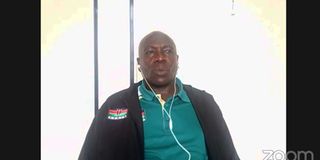John Ngugi: How I destroyed my life after track career

A screen grab of five-times world cross country champion John Ngugi during the National Olympic Committee of Kenya (NOC-K) webinar on finance and investment on May 28, 2020. PHOTO | NATION MEDIA GROUP
What you need to know:
- So rich was he that in 1993, he forked out Sh8 million in legal fees to defend himself after he was banned for declining to take an out-of-competition dope test
- An Olympic track champion and five-time world cross country champion, everything seemed to be working well for Ngugi, and sponsors were lining up to sign him up
- His life crumbled, businesses went broke and Ngugi was on self-destruct. His story dominated last Thursday’s National Olympic Committee of Kenya (NOC-K) webinar on financial discipline
John Ngugi was a rich man. A very rich man. And famous too.
So rich was he that in 1993, he forked out Sh8 million in legal fees to defend himself after he was banned for declining to take an out-of-competition dope test.
The case, in Monaco, went on and on...
Adjusted for inflation, that would be close to Sh12 million today.
An Olympic track champion and five-time world cross country champion, everything seemed to be working well for Ngugi, and sponsors were lining up to sign him up.
But he lost the case against the International Association of Athletics Federations (IAAF, now World Athletics) and everything went south.
In his defence, Ngugi had, inter alia, argued that as a military man, he wouldn’t have allowed the IAAF testing officer, John Whetton, to take his samples as the former European 1,500 metres champion was also not accompanied by a Kenyan official.

World Cross-Country Champion John Ngugi (left) tries hard to suppress a smile of contentment as he joins teammates Andrew Masai (centre) and Boniface Merande, in displaying some of their trophies they won in the recent competitions in Europe. PHOTO | FILE | NATION MEDIA GROUP
His life crumbled, businesses went broke and Ngugi was on self-destruct. His story dominated last Thursday’s National Olympic Committee of Kenya (NOC-K) webinar on financial discipline.
In the session moderated by Olympic Channel journalist Evelyn Watta, Ngugi regretted that lack of financial advisors made things worse for him.
On the panel were also former world marathon record holder, Patrick Makau, world 5,000 metres and cross country champion Hellen Obiri and former Harambee Stars skipper, Musa Otieno.
WRONG BUSINESSES
Ngugi, who turned 58 on May 10, said he and other athletes ended up engaging in wrong businesses due to lack of knowledge.
“We didn’t win much money compared to today, but one was able to do a lot,” Ngugi said. “I tried my hand in public transport business where I bought a matatu, but that proved a waste before I bought a lorry for transport.”
Ngugi said all that collapsed since the relatives he entrusted with the business let him down. “Most of those who were managers were only interested in what we made so that they can get their cut but didn’t advise us,” explained Ngugi adding that family members and friends came with all sort of problems and he generously “dished” out money to them.
In the webinar, Sheba Njagi, the head of training and communications at Centonomy, came in handy with advice on how to invest among other sound and positive financial engagements.
The conference that was the fifth by NOC-K and was also attended by NOC-K treasurer Anthony Kariuki.
CAREER OVER
A 23-man IAAF Council later cleared Ngugi to run again in May, 1995, but his career was already over.
“I knew I was innocent, hence I would win the case and run again. I also knew that even if I was to spend a lot, I would recover it since I was planning to break the 10,000 metres world record where I would win good money in bonuses,” said Ngugi, who blamed two of his managers and lack of education for his woes.
“They each wanted a control over me more so, I was working at Kenya Defence Forces where we operated under strict rules even out of the barracks,” Ngugi said.
He managed to save some money to buy land where he is now into farming.
“I want Athletics Kenya to continue on with the seminars that are geared towards empowering athletes with financial management skills. They should visit camps regularly,” said Ngugi.

A screen grab of the National Olympic Committee of Kenya (NOC-K) webinar on finance and investment on May 28, 2020. Clockwise from top, left: Moderator Evelyne Watta, National Olympic Committee of Kenya treasurer Eliud Kariuki, five-times world cross country champion John Ngugi, former world marathon record holder Patrick Makau, financial literacy coach Sheba Njenga and world 5,000 meters champion Hellen Obiri. PHOTO | NATION MEDIA GROUP
Makau, who was forced into early retirement by an injury in 2016, but invested in real estate, farming and athletics club, said the big challenge is when athletes start earning huge amount of money at young age.
“Running pays handsomely and that is why we should not relent on advising the youngsters on how well to invest.
MENTOR UPCOMING ATHLETES
“They need focused coaches, managers and mentors who will prepare them how to handle fame and money,” said Makau, who thanked NOC-K President Paul Tergat for having mentored him. “I consulted him from the word go and that is why all is well on my side.”
Obiri, who is also into farming, called on established and elite athletes need to mentor upcoming athletes adding that there are no reverse gears in life.
Otieno, who is now a coach at Daystar University, besides investing in housing and Kick off to Hope Foundation, expressed concern that local football players live from hand-to-mouth with little to save.
“I am lucky to have been close to people who taught me how to invest from my footballing career both locally and South Africa,” said Otieno.





